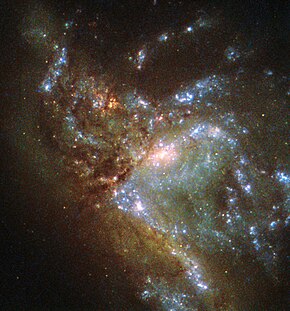NGC 6052 is a pair of galaxies in the constellation of Hercules.[2] It was discovered on 11 June 1784 by William Herschel.[4] It was described as "faint, pretty large, irregularly round" by John Louis Emil Dreyer, the compiler of the New General Catalogue.[4]
| NGC 6052 | |
|---|---|
 Hubble Space Telescope image of NGC 6052 | |
| Observation data (J2000 epoch) | |
| Constellation | Hercules |
| Right ascension | 16h 05m 12.880s[1] |
| Declination | +20° 32′ 32.61″[1] |
| Redshift | 0.015808[2] |
| Heliocentric radial velocity | 4739 km/s[2] |
| Distance | 399.05 ± 110.83 Mly (122.350 ± 33.980 Mpc)[2] |
| Apparent magnitude (V) | 13.00[3] |
| Apparent magnitude (B) | 13.44[3] |
| Characteristics | |
| Type | Sc[2] |
| Size | 110,900 ly (33,990 pc)[2][note 1] |
| Apparent size (V) | 0.9′ × 0.7′[2] |
| Other designations | |
| NGC 6064, Arp 209, UGC 10182, MGC+04-38-022, Mrk 297, PGC 57039[3] | |
The two components of NGC 6052 are designated NGC 6052A and NGC 6052B, respectively. The two, attracted by each other's gravity, have collided and are interacting with each other. NGC 6052 is currently in a late stage of merging, where the shape of the two galaxies is not distinctly defined.[5]
SN 1982aa, a powerful radio supernova, was detected in NGC 6052.[6]
Gallery
editSee also
editReferences
edit- ^ a b Skrutskie, Michael F.; Cutri, Roc M.; Stiening, Rae; Weinberg, Martin D.; Schneider, Stephen E.; Carpenter, John M.; Beichman, Charles A.; Capps, Richard W.; Chester, Thomas; Elias, Jonathan H.; Huchra, John P.; Liebert, James W.; Lonsdale, Carol J.; Monet, David G.; Price, Stephan; Seitzer, Patrick; Jarrett, Thomas H.; Kirkpatrick, J. Davy; Gizis, John E.; Howard, Elizabeth V.; Evans, Tracey E.; Fowler, John W.; Fullmer, Linda; Hurt, Robert L.; Light, Robert M.; Kopan, Eugene L.; Marsh, Kenneth A.; McCallon, Howard L.; Tam, Robert; Van Dyk, Schuyler D.; Wheelock, Sherry L. (1 February 2006). "The Two Micron All Sky Survey (2MASS)". The Astronomical Journal. 131 (2): 1163–1183. Bibcode:2006AJ....131.1163S. doi:10.1086/498708. ISSN 0004-6256. S2CID 18913331.
- ^ a b c d e f g "NED results for object NGC 6052". National Aeronautics and Space Administration / Infrared Processing and Analysis Center. Retrieved 24 November 2017.
- ^ a b c "NGC 6052". SIMBAD. Centre de données astronomiques de Strasbourg. Retrieved 24 November 2017.
- ^ a b "New General Catalog Objects: NGC 6050 - 6099". cseligman.com. Retrieved 24 November 2017.
- ^ Schmidt, Judy. "Two become one". Hubble Space Telescope. ESA/Hubble & NASA. Retrieved 2016-01-05.
- ^ Yin, Q. F. (1991). "IAUC 5276: NGC 6052; 1991b; 1989h1" (5276). IAU Circular.
{{cite journal}}: Cite journal requires|journal=(help) - ^ "Colliding galaxies". www.spacetelescope.org. Retrieved 4 March 2019.
Notes
edit- ^ RC3 D0 (blue) values used.
External links
edit- Media related to NGC 6052 at Wikimedia Commons